Have you ever seen a child acting like the "little adult" in their family? You know, the one who takes care of their siblings, cooks meals, or provides emotional support for their parents? At first, it might seem responsible or mature, but this behavior is known as parentification. Unfortunately, it can have lasting effects on a child's well-being.
In this blog, we'll explore what it really means, why it happens, and how it affects kids over time. We'll also share some surprising facts and offer tips on how parents can help prevent this situation. So, let's get started.
What is Parentification?
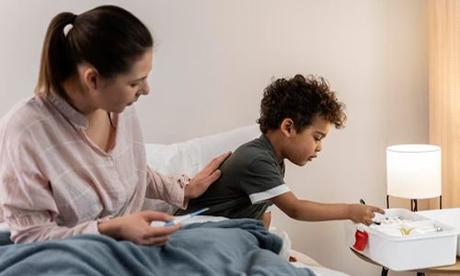
Okay, so parentification is when a child takes on responsibilities that are usually reserved for adults. It's when kids start managing the household or even becoming the emotional support system for their parents or siblings . Two main types of Parentification have been described below,
Instrumental
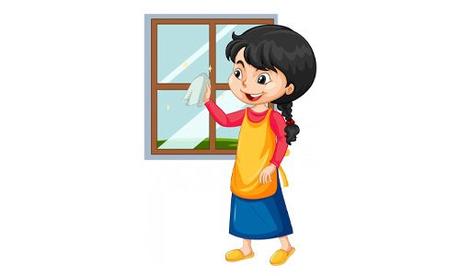
This is when kids take on physical tasks like cleaning, cooking, or looking after younger siblings. They might become "mini-managers" of the household.
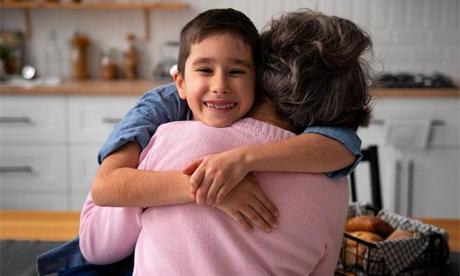
This one is more hidden but equally impactful. It's when children become the go-to person for emotional support in the family. They might be the ones comforting a parent when they're sad or mediating conflicts at home.
Now, this might sound like the child is just being helpful or "growing up fast," but the reality is it can be pretty heavy for a kid to carry.
Why Does it Happen?
You might wonder, "Why would a child end up in this role?" There are a few reasons this can happen,
Single-Parent Households

Without an extra set of hands, kids might naturally take on more responsibilities to support the family.
Parental Illness or Stress
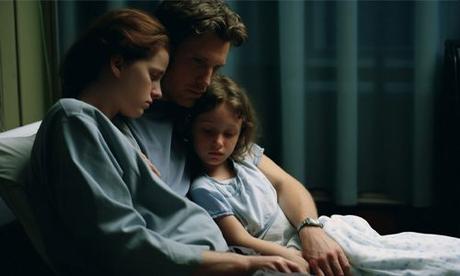
If a parent is dealing with chronic health issues, depression, or stress, kids often step up as caregivers, even though it's too much for their age.
Cultural or Social Norms
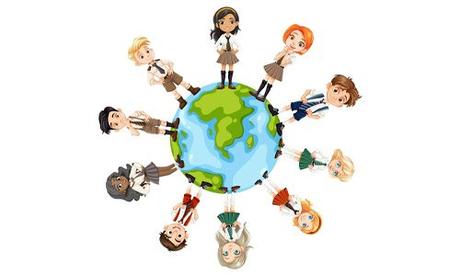
In some cultures, it's seen as a sign of maturity or duty for kids to take on adult-like roles. While it might build some resilience, it can also create a burden too early in life.
Knowing why it happens can help us see how it affects kids. It's important to create healthy boundaries and supportive family environments so that children can enjoy their childhood without unnecessary pressures .
Did You Know?
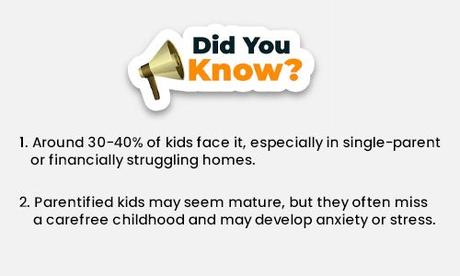
How Does Parentification Affect Children?
It might have some short-term "benefits," like kids learning problem-solving skills early, but the long-term effects can be significant.
Anxiety and Stress

Kids who take on adult roles often feel the weight of responsibility early on. Studies show that they tend to report higher levels of anxiety compared to their peers.
Difficulty with Boundaries
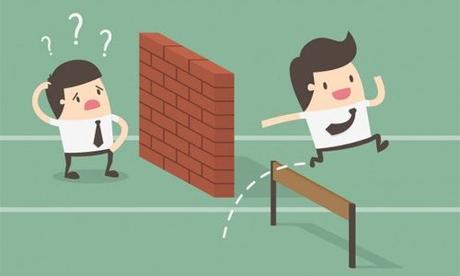
As adults, these children might become "people pleasers" because they grew up feeling responsible for everyone else's emotions.
Loss of Childhood
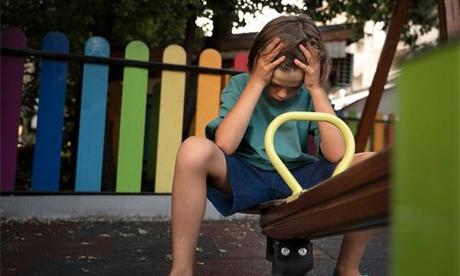
They might skip out on the carefree, playful aspects of childhood. Instead of playing with friends, they might be managing chores or supporting their parents emotionally.
Relationship Struggles as Adults
Parentified children can have difficulty forming healthy boundaries and relationships later on. They might struggle to trust others or feel overly responsible for their loved ones' happiness.
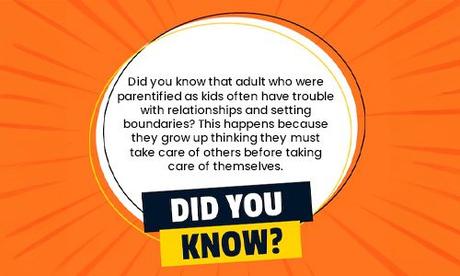
Did you know that adults who were parentified as kids often have trouble with relationships and setting boundaries? This happens because they grow up thinking they must take care of others before taking care of themselves.
Symptoms of Parentification
Symptoms of parentification can show up in different emotional , behavioral, and psychological ways as children take on responsibilities that are too much for them.
1. Excessive Responsibility and Maturity
Children take on adult roles like managing household tasks or caring for siblings, appearing more mature than their age suggests.
2. Emotional Burden and Stress
The child becomes an emotional support figure, often acting as a "therapist" or mediator for family conflicts.
3. Anxiety and Hyper-Vigilance
The child stays constantly alert, trying to manage or anticipate issues within the family.
4. Difficulty with Boundaries and People-Pleasing Behavior
Children struggle to set boundaries and often prioritize others' needs, becoming overly accommodating.
5. Suppressed Emotions and Trouble Expressing Needs
Children hide their feelings and avoid expressing needs, believing they must be strong for the family.
6. Perfectionism and Fear of Failure
The child may feel pressured to excel and fear letting others down, leading to perfectionistic behavior.
7. Limited Peer Relationships and Social Isolation
Due to their responsibilities, children may not have time for socializing with peers, leading to isolation.
8. Physical Symptoms Related to Stress
The stress of it often manifests physically, leading to headaches, stomachaches, or sleep problems.
9. Feelings of Guilt and Resentment
Children might feel guilty for wanting freedom or resentment for their responsibilities, leading to internal conflict.
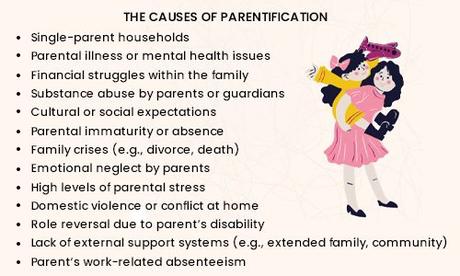
How to Prevent or Address Parentification?
Ever thought about how to keep your child from taking on too many adult responsibilities? Here are a few ways to prevent and address them.
Set Age-Appropriate Boundaries
Let your kids help out around the house, but make sure the tasks are right for their age. They shouldn't be handling adult responsibilities.
Seek Support When Needed
If you're dealing with stress or health problems as a parent, don't hesitate to ask for help, whether from a therapist, friends, or family. It helps ease your load and lets your kids be kids.
Encourage Play and Social Interaction
Make sure your child has time to play, hang out with friends, and enjoy hobbies. These activities are important for their growth and allow them to just be children.
Avoid Using Children as Emotional Support
It's fine to show your feelings to your kids, but don't expect them to act like your therapist. Adults need to find the right places to get emotional support.
By being mindful of your child's responsibilities and providing the right support, you can help them enjoy their childhood while growing up healthy and happy.
When to Seek Help?
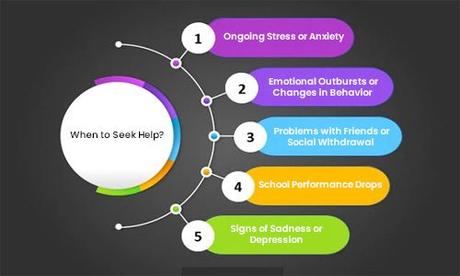
If you notice that a child is taking on more than they can handle, it's important to recognize when it's time to seek help.
1. Ongoing Stress or Anxiety
- If the child often complains about headaches, stomachaches, or has trouble sleeping, they may be feeling too stressed.
- Constant worry about family problems or acting overly alert and cautious are also signs that they might be overwhelmed.
2. Emotional Outbursts or Changes in Behavior
- If the child has sudden mood swings, gets angry easily, or shows signs of sadness, it could mean they are struggling with their responsibilities.
- They might also withdraw from activities they once enjoyed or behave differently than usual.
3. Problems with Friends or Social Withdrawal
- If the child avoids playing with friends, struggles to make connections, or prefers being alone, they might be feeling the weight of their role at home.
- Difficulty in joining social activities and making friends can be a sign that they're not getting enough time just to be kid.
4. School Performance Drops
- If grades start to slip, or the child has trouble focusing in class, they may be distracted by their responsibilities at home.
- A lack of motivation or tiredness can be signs that the stress is affecting their ability to keep up with school.
5. Signs of Sadness or Depression
- If the child shows signs like staying sad for long periods, losing interest in things they used to enjoy, or withdrawing from others, it's important to seek help.
- These symptoms may mean that the pressure they're under is becoming too much for them to handle on their own.
Parentification occurs when children take on too much responsibility at a young age, and it can really affect their emotional health. It's important to recognize the signs early and ensure they get support so they can have a balanced and happy childhood. Remember, kids should be kids, and helping them enjoy their childhood now sets them up for a healthier future.

Ashley completed her degree with nutrition as her major. She loves sharing her knowledge with others and playing with words. After struggling for almost a year to find a job that could make her feel lively, she ended up as a freelance writer. Ashley writes health-related blogs and articles. She makes sure that her works always stand unique and are useful for everyone. Ashley is also a YouTuber who shares health-related videos. She knows the value of the right information and how it can be beneficial to others. Therefore, her only motto is to provide accurate information. If Ashley sounds like that neighbor who you can ask for health tips, take a look at her works.

